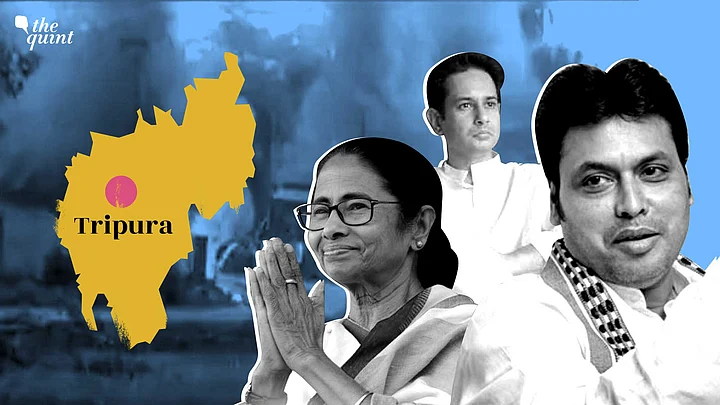Bangladesh has been in the news in India for a variety of reasons. Be it for overtaking its giant neighbour on key economic parameters or for the frequency at which it is mentioned in campaign speeches when states bordering it goes into polls.
The Durga Puja violence against Hindus in Bangladesh has been the most recent.
But it is important to note that attacks on Puja pandals in Bangladesh are not a new phenomenon, this happens with disturbing consistency. What was different this year was how it spread from Comilla to different corners of the country.
To their credit, the Bangladesh government led by Sheikh Hasina was able to demonstrate alacrity in dealing with the violence and the perpetrators.
What was also different was the coverage these incidents received in India. The response of the Indian government was guarded.
The right wing Hindutva brigade restricted it's outrage and provocations within the contours of the virtual world. There were no reports of attacks against Muslims in India that could be attributed to the developments in Bangladesh. This was the situation till 19 October. Then a series of attacks began in Tripura in which multiple mosques and establishments linked to the Muslim community were vandalised.
Reports were slow to come in. By the time the rest of India woke up to these incidents, these attacks had spread to most of Northern Tripura. The pattern of the attacks did give an impression of being planned.
But why Tripura of all places? And why now?
Before looking for answers to the above, let us first dispel a narrative that's been going around.
TRIPURA IS NO OASIS OF PEACE IN AN OTHERWISE TROUBLED REGION
The state is no stranger to violence. Either on political lines, exemplified by the 'Left vs Congress' clashes of earlier decades, or BJP vs Left or TMC in more recent times, or on ethnic lines.
Tripura has had its social fault lines. But that's got more to do on the lines of ethnicities. It has always been "Indigenous vs Bengali speaking". These fault lines have survived decades of Communist rule and the brief spells of Congress led governments.
These ethnic fault lines have seen the state embroiled in violent militant movements in the not too distant past.
But Muslims, as a religious minority, have never been targets of hate crimes until the recent past in which a few cases of lynchings did take place.
Muslims account for less than 10 percent of the state's population. It is one of the few states that have seen a massive reduction in the proportion of Muslim population post-independence. So, the narrative of "Hindu khatre mein hai" doesn't really find much traction in this state on the eastern margins of India.
THE POLITICAL CONTEXT
In 2018, BJP came to power riding on the support of two groups: the tribals, represented by its ally, Indigenous People's Front of Tripura and the dominant Bengali speaking population. But the party has been losing its clout among the indigenous population over the last two years.
The Tipraha Indigenous Progressive Regional Alliance, or TIPRA, a confederation of indigenous political and social outfits, led by Pradyot Bikram Manikya Debbarma, the scion of the erstwhile royal family of the state and a former Congressman, has managed to steadily wean away the tribal support from the ruling alliance.
And there is a new player in the block which is closely identified with the Bengali speaking people, both Hindus and Muslims - the Mamata Banerjee led Trinamool Congress.
There have been whispers in the political circles of Agartala, the state capital, of an alliance, formal or informal, between TIPRA and TMC.
This poses a clear danger to the BJP led alliance in the next assembly elections.
Biplab Deb, the incumbent Chief Minister has been on a sticky wicket for quite some time. There has been dissidence. There have been desertions to Trinamool.
With the loss of tribal support, the need to consolidate the Bengali-speaking Hindu votes has been acute.
The developments in Bangladesh just presented that opportunity.
Retaliatory actions could have taken place in a few more states - like West Bengal and Assam.
But after the last state elections, any such move on the part of right wing outfits in Bengal would have invited severe backlash from the government machinery as well as the general public.
The Assam Government, on the other hand, has been carrying out its own program of deepening the faultlines, with some degree of success. Therefore, right wing Hindu organisations may not have seen much political benefit in carrying out violence there.
So, it was Tripura.
The violence raises questions around the role of CM Biplab Deb, not just because the buck stops with him as the chief minister and home minister of Tripura, but also because of his close association with Hindutva organisations like the Hindu Jagran Manch, Bajrang Dal & Vishwa Hindu Parishad.
These are the very organisations who are being accused of carrying out violence against Muslims under the pretext or “Hindu retaliation”.
(The writer is a political analyst and brand consultant. He tweets at @RahulMukherji5. This is an opinion piece and the views expressed above are the author’s own. The Quint neither endorses nor is responsible for the same)
(At The Quint, we question everything. Play an active role in shaping our journalism by becoming a member today.)
